Topic: Constituent relations/service
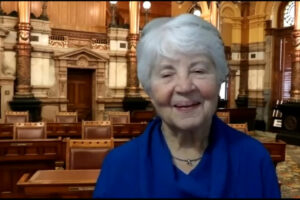
Interview of Sheila Frahm, November 13, 2020
Interviewed by Joan Wagnon
In this 2020 oral history interview, former Kansas State Senator Sheila Frahm reflects on her time in elected office from local school board to U.S. Senate. This interview was conducted on ZOOM with Frahm at her home in Arizona and the interviewer in Topeka. The interview begins with a discussion of an earlier (1991) interview conducted by a Washburn University professor that covers much of Frahm's background and her interest in education issues. It covers her life in Topeka in the early years of her service and how her family moved to Topeka with her for the session each year Show Moreand why. Frahm provides a unique point of view on the relationships between Governors and the Legislature. She discusses her decision to leave the legislature and run for Lt. Governor with Bill Graves and her subsequent appointment to fill a U.S. Senate vacancy when Bob Dole decided to run for President. This interview includes a segment during which Frahm talks about several issues in which she was involved: community colleges and out-district tuition and triple-trailers. During the interview Frahm reflects on her identity as a western Kansas legislator and how her roots, her up-bringing, shaped others' perceptions of her legislatively. She saw the years during which she served in the State Senate as very productive, citing school finance in 1992 and advances in higher education as two important policies that were enacted. The interview concludes with Frahm's reflections on the civility of the body, the importance of relationships to accomplish your goals, and advice to prospective candidates. Show Less

Interview of Dave Heinemann, July 10, 2014
Interviewed by Burdett Loomis
In this 2014 oral history interview, Dave Heinemann recalls his long career in the Kansas House representing Garden City, a career that spanned the years during which there were important changes in Kansas government. He served during an era when rural influence in the Legislature was waning due to fundamental changes in legislative districts. Heinemann's recollections of how legislators serve their constituents and how they worked with one another to craft legislation paint a picture of collaboration in the creation of public policy. His perspective points to the importance of personal relationships with colleagues within the chamber, Show Moreacross the rotunda in the Senate, and with the Governor's office. Show Less
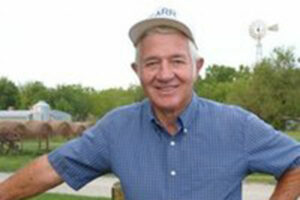
Interview of Gerald (Jerry) Karr, May 11, 2017
Interviewed by Janice Huston
This interview of Senator Jerry Karr by Janice Huston for the Lyon County Historical Society is lengthy, but gives great insight into the 18 years Karr spent in the Kansas Senate. It also covers his academic career which preceded his election and delves into rural life in Kansas. It begins with his Sierra Leone experiences teaching agricultural economics and other teaching jobs in the Midwest. Karr was elected to the state Senate in 1980 which is the time the farm crisis started boiling over in Kansas. During those first 10 years he developed legislation addressing Show Morethe farm crisis, including changing the method of selecting the Secretary of Agriculture, altering the classification and reappraisal of land, and regulating corporate hog farming. His service on the Joint Rules and Regulations Administrative committee helped him shape agricultural policy. He became Minority Leader ten years after his first election. Redistricting in 1991 ended up in the courts and spelled the end of many rural Democrats. There are numerous examples of policy making, particularly the details about the 1992 school finance legislation that amplify others’ accounts of that legislation. His examples of effective leadership and effective campaigning will be of interest to many. The interview also covers communication with constituents in a large district and has anecdotes about issues leaders have to deal with. Karr covers just about all aspects of leading a caucus and life in the Senate in the 1980s and 1990s. Show Less
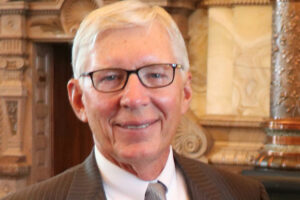
Interview of Dave Kerr, August 23, 2019
Interviewed by Dale Goter
In a 2019 oral history interview Dave Kerr recalls nearly 20 years in the Kansas Senate including his terms as Chair of the Senate Ways and Means Committee and President of the Senate. His tenure in the senate spanned the period when state resources were directed toward economic development, an effort he thought was much needed. Kerr also recalls the revamping of the public education funding formula in 1992 and reorganization of governance and oversight of postsecondary education. He observes that key characteristics of a leader are willingness to listen to various points of view and endure the Show More"slings and arrows" of leadership. Show Less

Interview of Fred Kerr, March 30, 2015
Interviewed by Burdett Loomis
This is the first of two oral history interviews of Fred Kerr in this collection. (Ed Flentje conducted the second interview 2018.) Kerr reflects on his 15 years in the Kansas Senate representing the 33rd Senate district. He recalls Senate leaders and fellow Senators who helped him as a freshman and the influence of those mentors on his career. Fred talks extensively about the process involved in securing a leadership position in the Senate and the dynamics of leadership races. He also reflects on the urban-rural divide in Kansas politics that during the late Show More1970s and early to mid 1980s was often more of a force than the partisan divide. A version of this interview is also posted on KansasMemory.org, the website of the Kansas Historical Society. A more recent oral history interview of Fred Kerr is here. Show Less
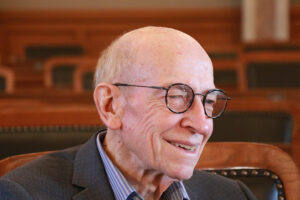
Interview of James (Jim) Maag, July 17, 2014
Interviewed by Burdett Loomis
In this 2014 oral history interview, Jim Maag reflects on his service in the Kansas House of Representatives (1969-1976) including his term as Speaker Pro Tem (1975-1976). It was a time of significant change and modernization of the Kansas Legislature and its processes. Maag provides a clear view into the evolution of the Legislature into a more professional organization. He comments on the bipartisan approaches to policymaking during that era when the urban-rural split affected the dynamic more often than purely partisan considerations. He was witness to the impact of the one person, one vote Show Morecourt case as well as the increased number of women legislators and the reduced number of attorneys. Jim's recollections draw a vivid picture of an institution in transition. His connection with the Legislature continued in his role of legislative liaison for Governor Bennett and later as a lobbyist for the Kansas Bankers Association. Show Less
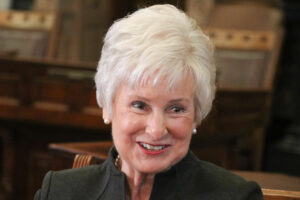
Interview of Alicia Salisbury, October 23, 2020
Interviewed by Patty Clark
Former Senator Alicia Salisbury grew up in a political family--both father and grandfather served in the legislature--so her sixteen years of service as a Kansas Senator continued the family tradition. She also was a serious legislator who believed in community service as witnessed by the numerous boards and committees on which she served, both volunteer and elected. Salisbury's driving interests were improving the economy of Kansas and bringing growth in wealth to her community and state. Salisbury's 2020 oral history interview chronicles her work ethic. With her children no longer at home, she had the Show Moretime and the interest to dive into a wide assortment of issues, from workforce development, to interstate banking, to telecommunication reform, to a blue ribbon panel on workers compensation. Salisbury worked long hours and focused on constituent services. She boldly asked for the committees that interested her and championed changes where necessary. Salisbury succeeded in changing the Labor and Industry Committee into the Commerce Committee to handle everything from economic development strategies to workers compensation. She tackled tough issues with a sense of humor and the skills of collaboration learned as a volunteer leader. This interview describes her determination, her commitment, and her legacy to the state of Kansas as Vice President of the Senate. Show Less

Interview of James (Jim) Maag, September 28, 2021
Interviewed by Joan Wagnon
The Kansas Oral History Project reviewed the original transcript of Dr. Burdett Loomis's interview of Representative Jim Maag and decided to recapture part of the interview on video for inclusion in a civic education series about the Kansas legislature. This videoed interview follows the original Loomis interview, asking similar questions. A transcription of the video is also posted here. In the original 2014 oral history interview, Jim Maag reflected on his service in the Kansas House of Representatives (1969-1976) including his term as Speaker pro tem (1975-1976). In this reprise of that interview, Maag's words come to life. Show MoreMaag's years in the House spanned a time of significant change and modernization of the Kansas Legislature and its processes. He provides a view into the evolution of the Legislature into a more professional organization. He comments on the bipartisan approaches to policymaking during that era when the urban-rural split affected the dynamic more often than purely partisan considerations. Maag was witness to the impact of the one person, one vote U. S. Supreme Court decision as well as the increased number of women legislators, and the reduced number of attorneys. Jim's recollections draw a vivid picture of an institution in transition. His connection with the Legislature continued in his role of legislative liaison for Governor Bennett and later as a lobbyist for the Kansas Bankers Association. Show Less

Interview of Carolyn Campbell, March 25, 2022
Interviewed by Eric. Sexton
Mrs. Campbell, as she is known around the Statehouse, has experienced an important part of state history in Kansas government. Following her 1991 retirement from Southwestern Bell, she has served countless numbers of elected legislators; then using that experience , she became an elected official in her own right in local and state school board positions. becoming the first African American to serve on the Kansas Board of Education. Mrs. Campbell started her interview with this: "I am a proud product of segregation. I tell that because folks sometimes think, “Oh, that’s too bad,” Show Morebut I want everybody to know that as a black child in Topeka with the four all-black elementary schools that we had, we got excellent education, and we were told that we could be whatever we wanted to be, and we were valued every day. " This interview covers her experiences as a 12 year member of the Topeka Public Schools Board of Education, and later her eight year term as a member of the State Board of Education where she was the first African American elected to this post.
Highlights -- short excerpts from the interview
